| |
Influence
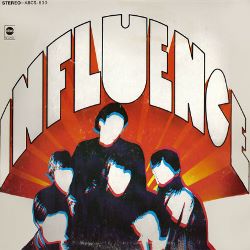
Influence
ABC - 1968
Nick Warburton
|
Montreal, in French-speaking Quebec, is not the obvious place you would find British musicians at the height of the 1960s rock explosion. But that's exactly where two expatriates reunited by chance in the spring of 1967 after first meeting in, of all places, South Africa nearly two years earlier. Irish-born lead guitarist Louis McKelvey spent his formative years playing with Twickenham, West London bands Johnny Eaton and the Pursuers and Jeff Curtis and the Flames. Regulars at the famous Ealing Club where the Rolling Stones were formed, Jeff Curtis and the Flames cut five tracks on an acetate with the late, legendary Joe Meek. McKelvey, however, grew restless and around September 1965 travelled to South Africa. There he met future Influence singer, Englishman Andy Keiller, and together they formed the Upsetters, recording another rare single, 'Daddy Rolling Stone' c/w 'Pain in My Heart'.
The two would return to England separately, but restless as ever would eventually make their way to Canada. McKelvey boarded the Empress of England in Liverpool in October 1966 and sailed to Montreal with only $10 in his pocket, briefly hooking up with Les Sinners and then two months later with Our Generation. Meanwhile, Andy Keiller, who amazingly had moved to Montreal from London in April 1966, contacted his former band mate from South Africa after catching Our Generation on the Barry Gordon TV show. The pair joined forces with two excellent local musicians, drummer Dave Wynne and bass player Jack Geisinger, who were born in England and the Czech Republic respectively but raised in Canada. As the quartet readied material to play their debut show, the band's musical direction was injected with a fresh and exciting new edge when vocalist/organist Bob Parkins, otherwise known as Bobo Island, and Italian-born guitarist Walter Rossi asked to join.
An abbreviated name, Influence were initially known as the Influence of Sadness Personified in Life, but mercifully this mouthful was shortened before any gigs were played, as McKelvey told Ed Pickersgill, editor for Montreal weekly magazine Music Trend in its 26 May issue. "It might be a bit silly for people to say they're going to see Influence of Sadness Personified in Life when they can much more easily go to see Influence."
Influence got its first paying gig at the Bonaventure Curling Club dance before landing a long-standing run at the Barrel (Le Baril) on Mountain Street through to early August. It was a hard period; Influence was making just under a dollar a night, but by playing five hours a night to an often near-empty house, they developed a unique stage performance and sound. The band then headed to Toronto in late August to play the city's vibrant club scene. At first Influence struggled to attract much interest, but after appearances at Boris' Red Gas Room and the Strawberry Patch, the group's reputation began to spread among the music cognoscenti. Back in Toronto, music publisher Jerry Renewych used his contacts at ABC Paramount to pass the group's demo on to producer Dennis Minogue (aka Terry Cashman) in New York. Minogue wasn't exactly blown away by the results but decided to take a chance and booked some studio time at Bell Studios during November.
With an album in the can, ABC set up a launch at Steve Paul's The Scene in late December to coincide with the Christmas release of Influence. The launch at Steve Paul's famous New York club went well and Buddy Miles (now with the Electric Flag) joined Influence on stage. Reviews were encouraging. "Best material for rock musical theatre we've heard yet," noted Hit Parader that same month, before going on to say: "Influence is a very strange and interesting collection of satire and putdowns. The music is vicious, almost maddening and Influence laughs at themselves as well as the drop out-tune-in set." Cash Box, in its 20 January 1968 issue, commented: "Like many Canadian rock groups, Influence places heavy emphasis on comedy, the basic difference in this case is that the comedy is not only original but truly hilarious. Having seen and heard Influence, we can only anticipate with pleasure their debut waxing on ABC, which is scheduled for release sometime late in January."
Though only recorded on four-track, Influence demonstrates how special the group was. The opening bars of the atonal 'I Admire', notable for its discordant riffs and unusual modulations, sets the tone for a record that smacks of musical ingenuity. Similarities with the Mothers of Invention are striking, although according to Keiller it was really the "interplay between Louis and Bob's unusual sense of humour and the influence of jazz musicians Sonny Murray and Archie Shepp, who we supported at Montreal clubs" that affected the group's stylistic approach. An example of this "unusual sense of humour" can be found on Parkins' 'County Fair', an amusing story concerning the sexual relations between a circus girl and a donkey. Another "unusual" track is the group's mini opera, 'Mad Birds of Prey', which allegedly impressed Pete Townsend. Despite positive reviews, Influence was too challenging to garner the success the group deserved and barely troubled the charts, peaking at #82 on the Billboard chart.
Influence returned to the Toronto club scene in mid-February (minus Dave Wynne, who had returned to Montreal and his studies), appearing regularly at Boris' and also performing an extended series of engagements at the Penny Farthing from 4-9 March. The following month, on 20 April, the band joined a number of local acts at the Canadian National Exhibition Hall, opening for the Doors. Influence next set out on a two-month US tour performing at the Chessmate (10-12 May) and the Grande Ballroom (17-19 May) in Detroit (opening for Procol Harum at the latter) before moving on to Chicago to play at the Electric Theatre (24-26 May) alongside Steppenwolf. A live album was recorded (on a non-professional machine) at the latter and allegedly captures the group's on-stage dynamics perfectly.
Internal dissension and financial difficulties, however, continued to dog the group, with Keiller next to leave. The singer would subsequently quit the music industry and return to England briefly before moving to Melbourne, Australia in 1971, where he now makes a living building fibreglass-bodied racing cars. McKelvey soon began to lose interest and in June/July 1968, he also left and returned to England. "None of them were getting along very well," remembers Rosemary White, McKelvey's then-partner, who witnessed the band's disintegration. "They were such different personalities. They were all really good musicians and very independent guys. Except for the ones who were strung out, the others were quite driven, focused and ambitious. They wanted to work." But according to lead guitarist Walter Rossi, the group's manager Bernie Cugelman's decision not to share management with Steppenwolf's team in the USA was another major reason behind Influence's eventual break up.
Influence did carry on briefly after McKelvey's departure but folded in mid-1969 when Rossi joined the Buddy Miles Express. Rossi and Geisinger reunited in late 1970 as members of Luke and the Apostles after Geisinger had played with McKelvey in Toronto band Milkwood. The final incarnation of this group (with drummer Mike Driscoll) morphed into power trio Charlee. Looking back, Wynne has this to say. "The strength of Influence was that all the musicians in the band had reputations as musicians. You also can't do humour or satire convincingly in music unless you are very good and very confident. You can't function as a creative group unless there is a mutual respect in each other's playing."
That certainly comes across on this brilliant overlooked album.
|
|
Suggestions
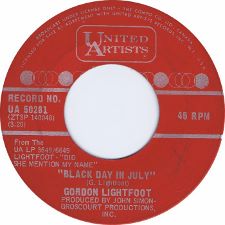
Gordon Lightfoot
Black Day in July / Pussywillows, Cat-Tails - 7"
United Artists
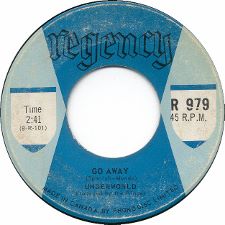
The Underworld
Bound b/w Go Away - 7"
Regency
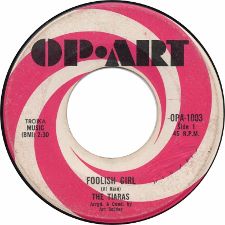
The Tiaras
Foolish Girl / Surprise - 7"
Op-Art
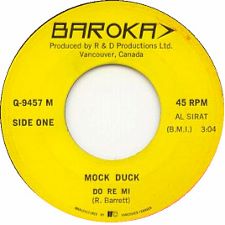
Mock Duck
Do Re Mi / Playing Games - 7"
Baroka
|








